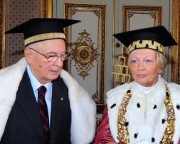14. 04. 2010| Eventi e convegni
“Harlem Renaissance”: the evolution of Afro-American blackness
Professor Martin Favor from Dartmouth College, New Hampshire, outlines the process of maturation and rebirth in consciousness and literature of black people from Harlem
Naples, 13th of April 2010. Donatella Izzo, Professor of Anglo-American literature at “L’Orientale” University in Naples, invites to the lecture hall number 125 in S.Maria Porta Coeli Building, via Duomo, the competent, motivated and energetic Martin Favor. Professor of American and Afro-American literature at Dartmouth College in New Hampshire, USA, he gave a lecture entitled “Ghetto chic: Fashioning Harlem and its Renaissance over Time”, being him expert about that both as a scholar and an author. The meeting, which also implied comments and questions by students and by professor Izzo herself, focused on the evolution of Harlem, the New York City suburb usually considered a “ghetto”, from a place of poverty and segregation to the cradle of relevant artistic and cultural movements: that is why we talk about renaissance.
It is clear, as the Professor often maintains, that this phenomenon has its main expression in literature, and one of its first manifestations was the concept of “new negro” which, together with the homonymous book edited by Alain Locke, had its origin in the twenties of the last century. The term indicates – even in a sort of romanticized way – a new self-consciousness thanks to which the Afro-American from Harlem transform their own past, never lived with awareness, and in particular the terrible experience of slavery, into the start of a cultural flowering independent from the white men. About that Martin Favor mentions the Afro-Puerto Rican historian Arthur Schomburg, who says that “the American Negro must remake his past in order to make his future”. And this reconstruction is possible through literature itself, an art which is propaganda, not “art for art’s sake” with aesthetic but not didactic goals. So Professor Favor shows several examples of literary works concerning this Afro-American rebirth, touching on the contemporary Hunting in Harlem by Mat Johnson but especially delving into Their eyes were watching God, published in 1937 and written by Zora Neale Hurston. The book, apart from being an interesting example of the Harlem cultural renewal, also deals with the differences between male and female gender, with an ever-present irony we can find in the title itself. From this point of view, it is almost an early case of feminism. Martin Favor finally stresses how the author gives language a great importance, using both standard and black-vernacular English. The latter, full of African influences, is relevant to dignify and make independent the self-rediscovery of this folk.
Parole chiave | tags
Trackback | url dell'articolo
http://magazine2.unior.it/trackback/864


Invia nuovo commento